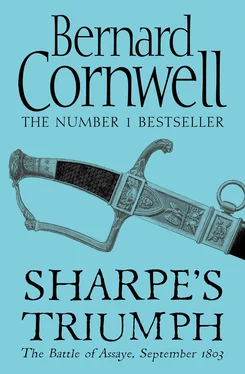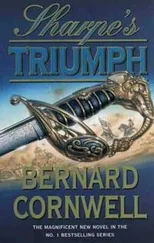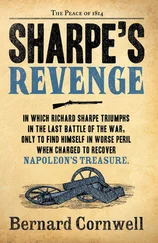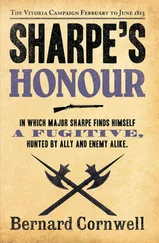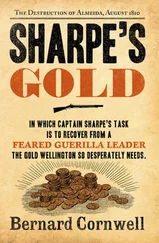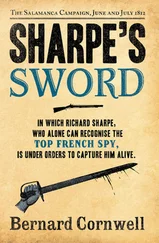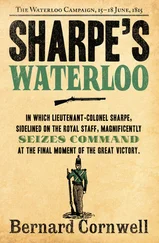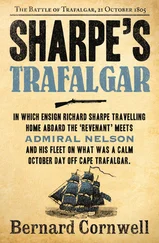‘Not an important city,’ Dodd commented. He noticed that Simone Joubert was sipping wine. She kept her eyes lowered, only occasionally glancing up at her husband or at Lieutenant Sillière. She took no notice of Dodd, but she would, he promised himself, she would. Her nose was too small, he decided, but even so she was a thing of pale and fragile wonder in this hot, dark-skinned land. Her blonde hair, which was hung with ringlets in a fashion that had prevailed ten years before in Europe, was held in place by small mother-of-pearl clips.
‘Ahmednuggur is not important,’ Pohlmann agreed, ‘but Scindia hates losing any of his cities and he stuffed Ahmednuggur full of supplies and insisted I post one regiment inside the city.’ He nodded towards the white-coated troops. ‘That regiment, Major. It’s probably my best regiment, but I am forced to quarter it in Ahmednuggur.’
Dodd understood Pohlmann’s predicament. ‘You can’t take them out of the city without upsetting Scindia,’ he said, ‘but you don’t want to lose the regiment when the city falls.’
‘I can’t lose it!’ Pohlmann said indignantly. ‘A good regiment like that? Mathers trained it well, very well. Now he’s gone to join our enemies, but I can’t lose his regiment as well, so whoever takes over from Mathers must know how to extricate his men from trouble.’
Dodd felt a surge of excitement. He liked to think that it was not just for the money that he had deserted the Company, nor because of his legal troubles, but for the long overdue chance of leading his own regiment. He could do it well, he knew that, and he knew what Pohlmann was leading up to.
Pohlmann smiled. ‘Suppose I give you Mathers’s regiment, Major? Can you pull it out of the fire for me?’
‘Yes, sir,’ Dodd said simply. Simone Joubert, for the first time since she had been introduced to Dodd, looked up at him, but without any friendliness.
‘All of it?’ Pohlmann asked. ‘With its cannon?’
‘All of it,’ Dodd said firmly, ‘and with every damned gun.’
‘Then from now it is Dodd’s regiment,’ Pohlmann said, ‘and if you lead it well, Major, I shall make you a colonel and give you a second regiment to command.’
Dodd celebrated by draining his cup of wine. He was so overcome with emotion that he hardly dared speak, though the look on his face said it all. His own regiment at last! He had waited so long for this moment and now, by God, he would show the Company how well their despised officers could fight.
Pohlmann snapped his fingers so that a servant girl brought him more rum. ‘How many men will Wellesley bring?’ he asked Dodd.
‘No more than fifteen thousand infantry,’ the new commander of Dodd’s regiment answered confidently. ‘Probably fewer, and they’ll be split into two armies. Boy Wellesley will command one, Colonel Stevenson the other.’
‘Stevenson’s old, yes?’
‘Ancient and cautious,’ Dodd said dismissively.
‘Cavalry?’
‘Five or six thousand? Mostly Indians.’
‘Guns?’
‘Twenty-six at most. Nothing bigger than a twelve-pounder.’
‘And Scindia can field eighty guns,’ Pohlmann said, ‘some of them twenty-eight-pounders. And once the Rajah of Berar’s forces join us, we’ll have forty thousand infantry and at least fifty more guns.’ The Hanoverian smiled. ‘But battles aren’t just numbers. They’re also won by generals. Tell me about this Major General Sir Arthur Wellesley.’
‘Boy Wellesley?’ Dodd responded scathingly. The British General was younger than Dodd, but that was not the cause of the derisory nickname. Rather it was envy, for Wellesley had connections and wealth, while Dodd had neither. ‘He’s young,’ Dodd said, ‘only thirty-four.’
‘Youth is no barrier to good soldiering,’ Pohlmann said chidingly, though he well understood Dodd’s resentment. For years Dodd had watched younger men rise up through the ranks of the King’s army while he had been stuck in the Company’s hidebound ranks. A man could not buy promotion in the Company, nor were promotions given by merit, but only by seniority, and so forty-year-old men like Dodd were still lieutenants while, in the King’s army, mere boys were captains or majors. ‘Is Wellesley good?’ Pohlmann asked.
‘He’s never fought a battle,’ Dodd said bitterly, ‘not unless you count Malavelly.’
‘One volley?’ Pohlmann asked, half recalling stories of the skirmish.
‘One volley and a bayonet charge,’ Dodd said, ‘not a proper battle.’
‘He defeated Dhoondiah.’
‘A cavalry charge against a bandit,’ Dodd said scornfully. ‘My point, sir, is that Boy Wellesley has never faced artillery and infantry on a real battlefield. He was jumped up to major general solely because his brother is Governor General. If his name had been Dodd instead of Wellesley he’d be lucky to command a company, let alone an army.’
‘He’s an aristocrat?’ Pohlmann enquired.
‘Of course. What else?’ Dodd asked. ‘His father was an earl.’
‘So…’ Pohlmann put a handful of almonds in his mouth and paused to chew them. ‘So,’ he went on, ‘he’s the younger son of a nobleman, sent into the army because he wasn’t good for anything else, and his family purchased him up the ranks?’
‘Exactly, sir, exactly.’
‘But I hear he is efficient?’
‘Efficient?’ Dodd thought about it. ‘He’s efficient, sir, because his brother gives him the cash. He can afford a big bullock train. He carries his supplies with him, so his men are well fed. But he still ain’t ever seen a cannon’s muzzle, not facing him, not alongside a score of others and backed by steady infantry.’
‘He did well as Governor of Mysore,’ Pohlmann observed mildly.
‘So he’s an efficient governor? Does that make him a general?’
‘A disciplinarian, I hear,’ Pohlmann said.
‘He sets a lovely parade ground,’ Dodd agreed sarcastically.
‘But he isn’t a fool?’
‘No,’ Dodd admitted, ‘not a fool, but not a general either. He’s been promoted too fast and too young, sir. He’s beaten bandits, but he took a beating himself outside Seringapatam.’
‘Ah, yes. The night attack.’ Pohlmann had heard of that skirmish, how Arthur Wellesley had attacked a wood outside Seringapatam and there been roundly thrashed by the Tippoo’s troops. ‘Even so,’ he said, ‘it never serves to underestimate an enemy.’
‘Overestimate him as much as you like, sir,’ Dodd said stoutly, ‘but the fact remains that Boy Wellesley has never fought a proper battle, not with more than a thousand men under his command, and he’s never faced a real army, not a trained field army with gunners and disciplined infantry, and my guess is that he won’t stand. He’ll run back to his brother and demand more men. He’s a careful man.’
Pohlmann smiled. ‘So let us lure this careful man deep into our territory where he can’t retreat, eh? Then beat him.’ He smiled, then hauled a watch from his fob and snapped open the lid. ‘I have to be going soon,’ he said, ‘but some business first.’ He took an envelope from his gaudy coat’s pocket and handed the sealed paper to Dodd. ‘That is your authority to command Mathers’s regiment, Major,’ he said, ‘but remember, I want you to bring it safely out of Ahmednuggur. You can help the defence for a time, but don’t be trapped there. Young Wellesley can’t invest the whole city, he doesn’t have enough men, so you should be able to escape easily enough. Bloody his nose, Dodd, but keep your regiment safe. Do you understand?’
Dodd understood well enough. Pohlmann was setting Dodd a difficult and ignoble task, that of retreating from a fight with his command intact. There was little glory in such a manoeuvre, but it would still be a difficult piece of soldiering and Dodd knew he was being tested a second time. The first test had been Chasalgaon, the second would be Ahmednuggur. ‘I can manage it,’ he said dourly.
Читать дальше
